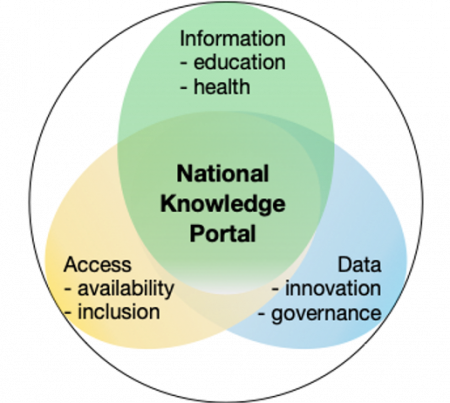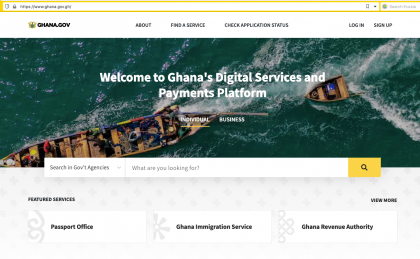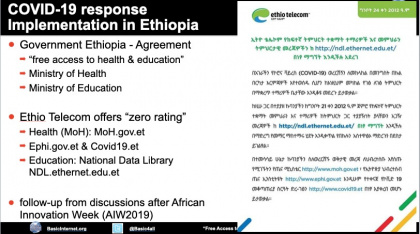Difference between revisions of "BasicInternet:AfricaUniversity-BasicInternet May2020"
From its-wiki.no
Josef.Noll (Talk | contribs) |
Josef.Noll (Talk | contribs) |
||
| Line 14: | Line 14: | ||
* Role of partners: Universities, private companies, government, .... | * Role of partners: Universities, private companies, government, .... | ||
* Project funding | * Project funding | ||
| − | + | ||
| − | + | ||
| − | + | ||
| − | + | ||
| − | + | ||
=== Digitisation of Zimbabwe through the National Knowledge Portal === | === Digitisation of Zimbabwe through the National Knowledge Portal === | ||
[[File:National_Knowledge_Portal.png|450px|right|thumb|''Figure 1: The three dimensions of the National Knowledge Portal for digital empowerment'']] | [[File:National_Knowledge_Portal.png|450px|right|thumb|''Figure 1: The three dimensions of the National Knowledge Portal for digital empowerment'']] | ||
| Line 33: | Line 29: | ||
* Ghana has now (June2020) opened the National Portal, focussing on financial and governmental services | * Ghana has now (June2020) opened the National Portal, focussing on financial and governmental services | ||
* Ethiopia has changed the regulations with free access to the National Digital Library (http://NDL.ethernet.edu.et), as well as to the Ministry of Health, and additional COVID-19 pages. | * Ethiopia has changed the regulations with free access to the National Digital Library (http://NDL.ethernet.edu.et), as well as to the Ministry of Health, and additional COVID-19 pages. | ||
| − | |||
| − | |||
| + | [[File:GhanaNationalPortal.png|420px|left|thumb|''Figure 2: National Portal in Ghana opened'']] | ||
| + | [[File:Ethiopica_zeroRated_2Jun2020.jpg|420px|right|thumb|''Figure 3: Free access to information on health and education in Ethiopia'']] | ||
| + | |||
| + | === Collaboration for Digitisation=== | ||
How does the Basic Internet Foundation work | How does the Basic Internet Foundation work | ||
* see our Wiki: [[BasicInternet:Home|BasicInternet.no]], and [[BasicInternet:How_To|How to establish an information spot]] | * see our Wiki: [[BasicInternet:Home|BasicInternet.no]], and [[BasicInternet:How_To|How to establish an information spot]] | ||
* Example: Hackathon in Dar es Salaam: https://its-wiki.no/wiki/DigI:TZ-Hackathon_Feb2020
| * Example: Hackathon in Dar es Salaam: https://its-wiki.no/wiki/DigI:TZ-Hackathon_Feb2020
| ||
| − | * Our solution for an Information Spot, targeting OPEX of 20 USD/month: | + | * Our solution for an Information Spot, targeting OPEX of 20 USD/month:
[[BasicInternet:Solution|Solutions.Basicinternet.no]]
|
| − | + | ||
| + | Our focus is on knowledge transfer and collaboration | ||
| + | * We require a local partner who should in this case could be Africa University together with private companies (for the roll out) like Zimre(?''spelling'') | ||
| + | |||
| + | In addition to the ''discussion on connectivity'', we also offer University collaboration - looking for academic collaboration opportunities with University of Oslo (UiO), the [http://uio.no/mn/its Department of Technology Systems.]We see that we will only make the change when bringing together all stakeholders: | ||
| + | * Governments to see the need for digitisation | ||
| + | * Academics for higher education and research on "digital inclusion" and "empowerment" | ||
| + | * Private business for innovation in the digital society | ||
| + | * an empowered Society for adaptation of digital solutions | ||
| + | |||
| + | === Project funding === | ||
| + | The Basic Internet Foundation requires funding | ||
| + | Project funding | ||
Village platform development (for technologists) | Village platform development (for technologists) | ||
Revision as of 12:50, 9 June 2020
| AfricaUniversity-BasicInternet May2020 | |||||||
|---|---|---|---|---|---|---|---|
|
BasicInternet:AfricaUniversity-BasicInternet May2020
| Title | BasicInternet:AfricaUniversity-BasicInternet_May2020 |
|---|---|
| Place | Zoom.us |
| Date, Time | 2020/05/26, 1400-1500h |
| Contact Person | Sanjay Maharaj |
| Participants | Josef.Noll, Brenda Jimris-Rekve, Munashe Furusa, Pius I T Muzariri, Sanjay Maharaj |
| related to Project | BasicInternet |
| Keywords |
| this page was created by Special:FormEdit/Meeting, and can be edited by Special:FormEdit/Meeting/BasicInternet:AfricaUniversity-BasicInternet May2020 |
| Category:Meeting |
Notes from the meeting
Follow up topics
- National Knowledge Portal and Digitisation for Zimbabwe
- Collaboration amongst Universities (vice chancellors)
- Role of partners: Universities, private companies, government, ....
- Project funding
Digitisation of Zimbabwe through the National Knowledge Portal
A National Knowledge Portal combines three aspects (see Figure 1), all being central for the digitisation of Zimbabwe, including the government, entrepreneurs, and every single inhabitant:
- Knowledge distribution for education, health, governmental information, as well as digital public goods. As an example, the portal may hold courses to acquire digital skills, and handle certificates for the educational sector.
- Data governance and innovation of national data is the core for value creation within the country. “Data is the new oil”, this statement of Telenor’s CEO Sigve Brekke demonstrates the value of data, and the need for building the economy around these national data.
- Inclusive access to the National Knowledge Portal is an easy way ahead for regulations. License conditions for Internet Service Providers (ISPs) and Mobile Operators could include the “free access to the National Knowledge Portal” as a prerequisite for a license.
see more at National Knowledge Portal
We invite for discussion on the Strategy for National Knowledge Portal - please add your comments https://docs.google.com/document/d/18aln9OlCN-HvjlgaDXWfZeQvKogR_XbTNrNprfNwqBc/edit
Example from other states in Africa: Ghana has opened a national portal, and Ethiopia provides free access to education and health:
- Ghana has now (June2020) opened the National Portal, focussing on financial and governmental services
- Ethiopia has changed the regulations with free access to the National Digital Library (http://NDL.ethernet.edu.et), as well as to the Ministry of Health, and additional COVID-19 pages.
Collaboration for Digitisation
How does the Basic Internet Foundation work
- see our Wiki: BasicInternet.no, and How to establish an information spot
- Example: Hackathon in Dar es Salaam: https://its-wiki.no/wiki/DigI:TZ-Hackathon_Feb2020
- Our solution for an Information Spot, targeting OPEX of 20 USD/month: Solutions.Basicinternet.no
Our focus is on knowledge transfer and collaboration
- We require a local partner who should in this case could be Africa University together with private companies (for the roll out) like Zimre(?spelling)
In addition to the discussion on connectivity, we also offer University collaboration - looking for academic collaboration opportunities with University of Oslo (UiO), the Department of Technology Systems.We see that we will only make the change when bringing together all stakeholders:
- Governments to see the need for digitisation
- Academics for higher education and research on "digital inclusion" and "empowerment"
- Private business for innovation in the digital society
- an empowered Society for adaptation of digital solutions
Project funding
The Basic Internet Foundation requires funding Project funding
Village platform development (for technologists) https://docs.google.com/document/d/1Xcbx2iHGaleRRjQ-Y6nDu3Dr254gQtZNS507Qh1kH2A/edit
Business model with operators
- Demand for free access to information
- 5G, https://its-wiki.no/images/a/ac/202002_5G_IoT_Sustainability_Noll.pdf



